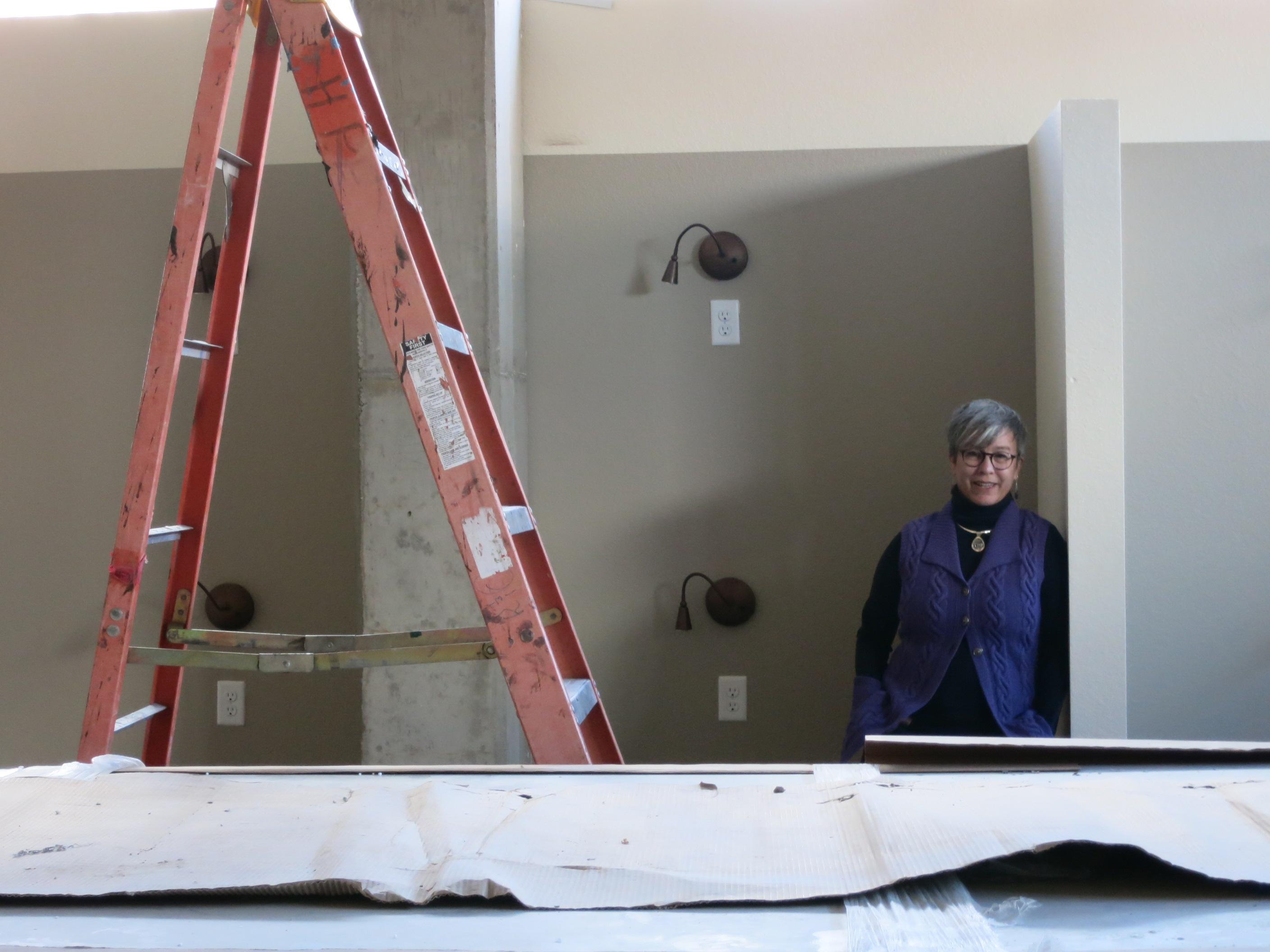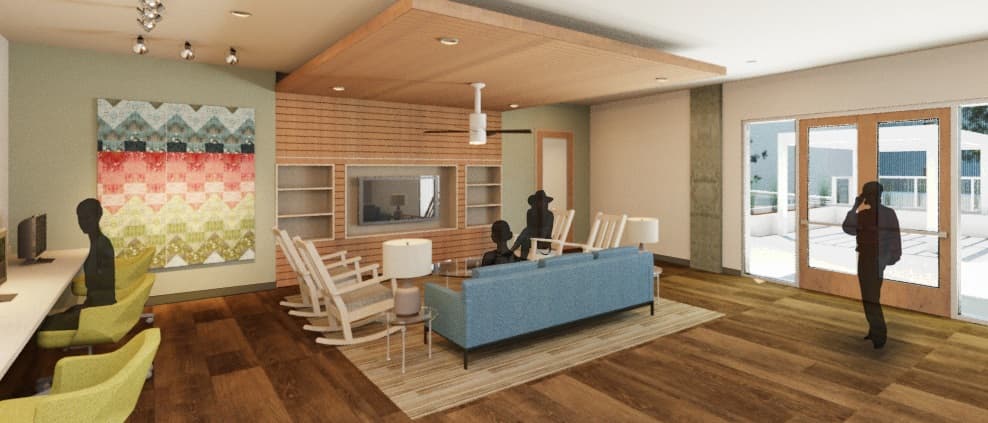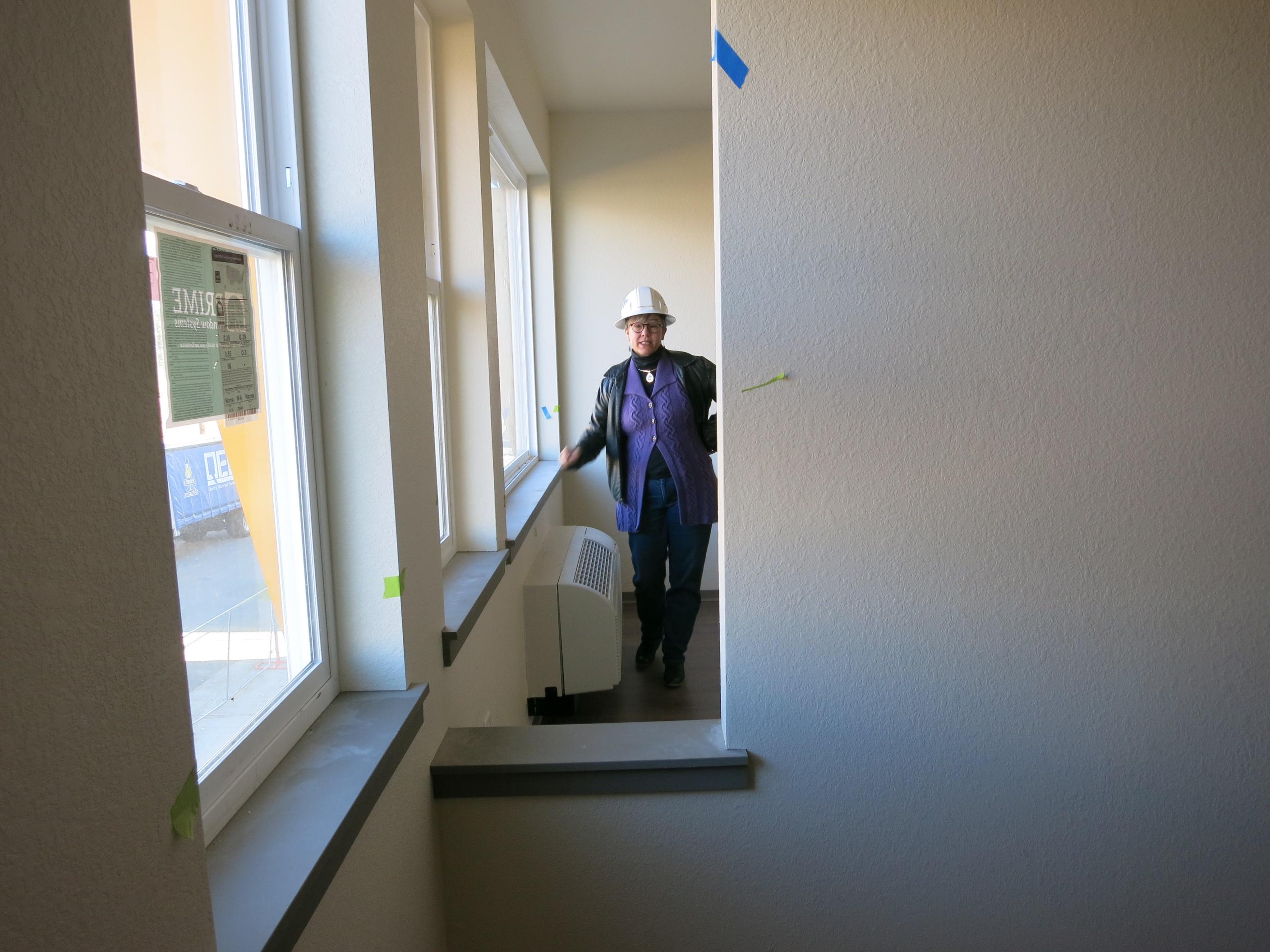In the 1990s, when she was managing fundraising and membership for the Denver Art Museum, Terrell Curtis had to pay close attention to detail as she juggled caterers, donors and art.
When everything came together, she would have "a very successful event that enriches the museum and the community," Curtis said.
"Creating low-income housing is kind of like that. It just takes a whole lot more people and time. It's like one big, long, very special event that impacts community for the long haul."
Curtis is wrapping up a 10-year tenure as executive director of the Delores Project. If you email her now, you'll get an automatic notification that her last day as head of the shelter for homeless women and transgender people is Nov. 15. The interim director is Laura Rossbert.
Curtis is leaving just months before the opening of what many see as her legacy at Delores: a new, bigger, more welcoming shelter that is part of an affordable housing project at West 13th Avenue and King Street that will serve people who have been chronically homeless. The parallels are likely to be clearer between her work at Delores and Curtis's next incarnation. She said she has not yet determined what that will be, but she wants to do more to contribute to addressing Denver's affordable housing crisis.
Chris Conner, who directs the city agency Denver's Road Home that coordinates homelessness services, said he suspects Curtis "really has the bug for housing now and will continue to be a partner" in the effort to address homelessness.

An art major finds a calling.
Curtis started working for DAM after earning an art history degree from CU Boulder and a stint as an event planner in Chicago.
"And then I became pregnant with twins," she said.
In search of a part-time job that would allow her time to raise her twin boys and their older brother, Curtis left DAM and saw a newspaper ad from The Gathering Place. The daytime drop-in center for women, their children, and transgender individuals experiencing poverty and homelessness needed a part-time fundraiser. Curtis signed on in 1999 and in 2000 moved from fundraising to a full-time communications post.
"I had the best job. Because I got to tell the stories of the people that we served," she said.
Curtis discovered she had a lot in common with them. She'd known failure, having dropped out as a freshman during her first try at college. She has relatives who have experienced mental illness. For a time, she, her husband, their children and their pets were living in her father's basement. She said it wasn't until she got to The Gathering Place that she realized she'd been couch-surfing.
"But what I've always had is a supportive network of people," she said.
At The Gathering Place and The Delores Project, she has been able to "increase access to housing and increase increase access, especially for vulnerable folks, to those things I had that helped me to be successful."
Her work at The Gathering Place included managing relations with the Park Hill community when the drop-in center took up temporary residence at Montview Presbyterian while a new permanent home was being built in City Park West. Curtis, herself a Park Hill resident, encountered some NIMBYism.
"It was extremely challenging," she said. But "it all turned out very successfully. I made some great volunteer and funding partners out of my neighbors."
By 2008 Curtis was looking for a new challenge.
Around the time she had started with The Gathering Place, it and other partners had founded The Delores Project. The shelter was named for Delores Big Boy, a woman who suffered health and substance abuse problems and physical and sexual violence before dying on the streets of Denver in in 1999.
The Delores Project was initially open only during the winter. It had relied on borrowed spaces before being able to buy its own building in 2006 and offer year-round services. It had undergone a few changes of leadership before Curtis stepped in.
Leslie R. Foster, the longtime leader of The Gathering Place, said she was happy to recommend Curtis to Delores and impressed by what her former employee has accomplished there.
"She was just so interested in what more she could do and what more she could learn. That's a great quality to have in a leader," Foster said. "She deserves just a huge amount of credit for taking that organization from a small, grassroots, part-time shelter to a housing developer."
Typically about 50 women and transgender people spend nights and weekends at Delores, where they can take classes in life skills, yoga or self defense. They can also get support from the project's own staff as well as other providers that can put them on a path to permanent housing. A case manager might accompany a guest to an interview with a potential landlord or to address a benefits problem at a social services office.
Curtis said the key is having the best people on the front lines.
"If I don't know how to do it, I know how to find the people who do," she said.
That could be a housing developer's job description.
She took on that role almost by accident when Dick Taft, president and CEO of the affordable housing developer Rocky Mountain Communities came calling one day.
Rocky Mountain Communities owned an aging complex across the alley from The Delores Project. Taft, who wanted to tear down his apartments and build new ones, suggested a partnership with Delores that would allow them to make better use of their plots by joining them. He found a receptive audience. Curtis said she, her board and her staff had been thinking for years that they needed to find a way to leverage their property to better support their clients.
In June of 2016, Delores, Rocky Mountain Communities and a third partner, BlueLine Development, announced they had received a total of more than $2 million in federal and state tax credits for their project. They broke ground the following August on a planned 130-unit complex. Ninety-five of the apartments will be one-, two- and three-bedroom units for low-income families in what will be known as Arroyo Village, managed by Rocky Mountain. In addition to a shelter in the complex, Delores will manage a separate residence called Xenia — a reference to the Greek concept of hospitality. Xenia has 35 one-bedroom apartments for people who have experienced homelessness. The Mental Health Center of Denver is among the partners who will be providing on-site services alongside Delores staff.
Conner, of Denver's Road Home, said, "The new incarnation of Delores Project is setting the bar in terms of what shelter service can be."
He added other organizations in Denver that have run shelters or drop-in services for people experiencing homelessness now were also considering building permanent housing.
Curtis "certainly has a vision that was spot-on," Conner said.
Delores had 8,000 square feet in the old shelter, which was razed along with Taft's old apartments. Delores, homeless itself for the past year, has been borrowing space from Volunteers of America for its clients during construction.
The new shelter will have 11,000 square feet. It will have beds for about the same number of clients it has had in the past, but more space to serve them, including more private spaces for activities such as intake interviews. It also has a full commercial kitchen. The old building did not have much space for cooking and most meals were prepared off-site for volunteers. Volunteers have wanted to come to cook for the guests, Curtis said.
"We'll be able to partner even deeper with our communities," she said.

A mental health workshop influenced the architecture.
During the design process the developers and architects sat down for a workshop on trauma-informed care with mental health experts. Many Delores clients "have experienced significant trauma aside from homelessness," Curtis said.
The Xenia units have walls of windows in the sitting rooms and an opening in the walls between the sitting rooms and bed rooms so that residents can keep tabs on their surroundings.
A courtyard off the shelter will be landscaped with lavender and rosemary for scent and lambs ear for touch and other plants meant to engage senses beyond sight.
"There's a huge component of nature in trauma-informed care," Curtis said.
The Gathering Place's Foster recently toured the site, which is in the final stages of construction.
"It's magnificent. They paid attention to every detail," Foster said.

The complex is off a fast-changing stretch of West Colfax.
While the interior tones of the shelter are calming, warm earth tones, the exterior is bright blues, purples, oranges and yellows. The facade looks like a flag waving a welcome to passersby.
"We're adding low-income affordable density in a neighborhood that is quickly gentrifying," Curtis said of the complex two blocks from West Colfax, not far from Alamo Drafthouse and Little Man Ice Cream and steps from the RTD W Line's Knox Station.
The Denver Housing Authority will provide vouchers for residents of Xenia, reserved for people earning 30 percent or less of the area median income. Arroyo Village is for people earning no more than 50 percent of AMI.
"Through this project I've developed a real passion for low-income and affordable housing development," Curtis said, adding her experience in human services gives her unique perspective.
And "let's face it, real estate development needs more women. A lot of industries do," she said. "I love leading teams. I love working with good teams."
Curtis has advocated for people experiencing homeless in public discussions. She opposed the ban on urban camping that Denver's City Council approved in 2012, saying "it hasn't worked to leverage enough shelter services" and noting many people experiencing homelessness do not feel safe in shelters.
Curtis said she believes she is seeing at least the "beginning of the investments in affordable housing that it's going to take" to address the crisis. The city is doubling its spending on affordable housing.
Curtis is on the threshold of a new career.
But she said it was too soon to say whether the Xenia complex would be the major achievement of her work sheltering the homeless. That would depend, she said, on what happens to a "very special person who I have known since my time at The Gathering Place."
That person, who is getting older and frailer, has found permanent housing in the past only to walk away because of mental health issues. At Xenia, the person would have the kind of support they have received at Delores, the only shelter where they will stay.
"That would be my crowning achievement if that person were to accept Xenia housing and live out their life there," Curtis said.














